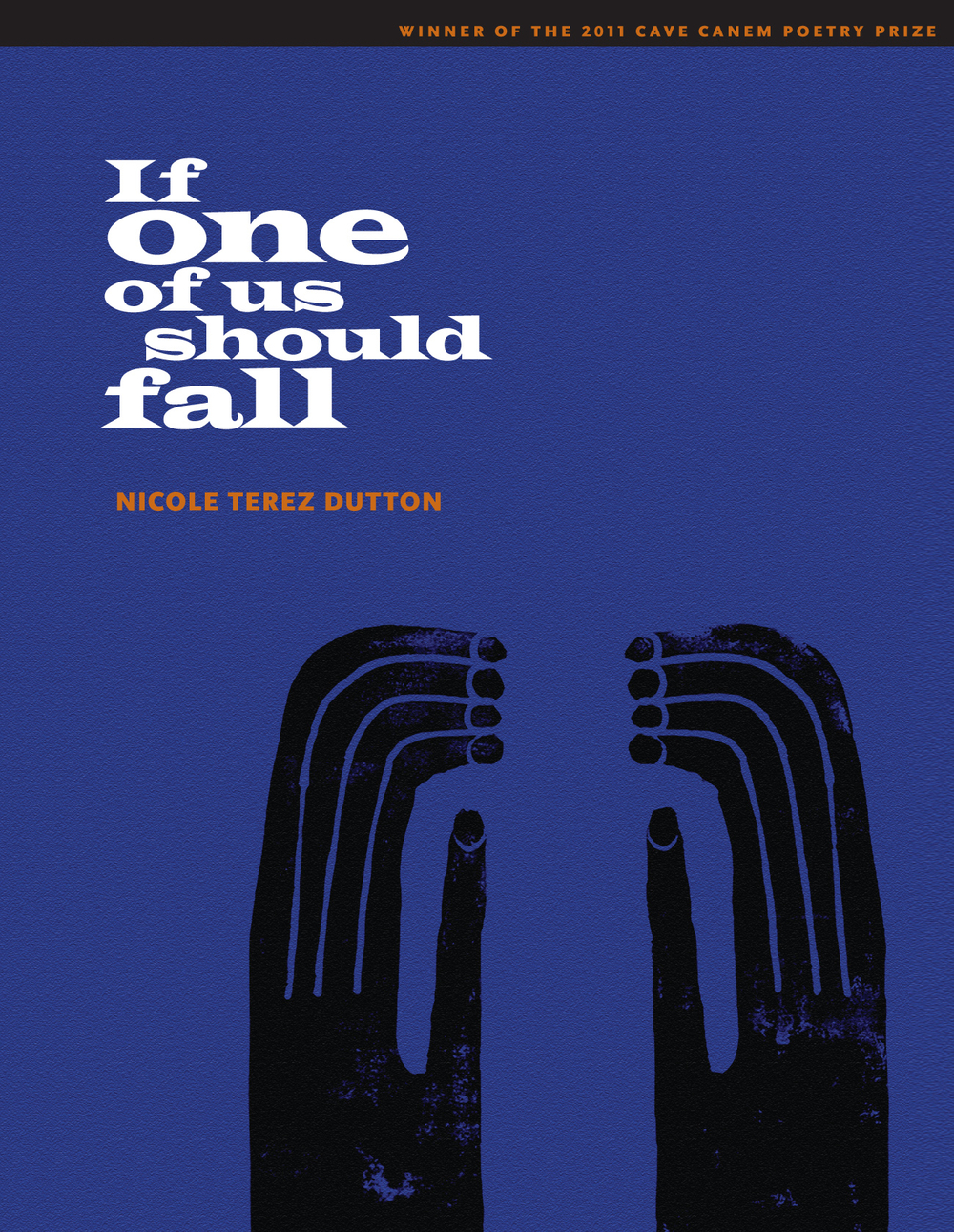
I see Nicole Terez Dutton’s collection, If One of Us Should Fall, as an exploration of the tension between motion and stillness. The collection focuses on the travels of a performing musical group, and music is woven through the language, driving the pieces forward and adding another dimension for movement. Just as the content of the poems examines the possibilities of movement through space and time, the structure of the collection itself marches boldly in unexpected directions.
The places that these poems move through are dynamic, and unabashedly colored by the motion of their speaker. The places in the poems are characterized through a combination of description of manmade cultural scene, often the venues where the band plays, and landscape. In Texas Dutton observes “the dance floor, empty/ and ale-sticky before the thundering/ of Stetsons,” and, in the same poem “the ground leaps up/to catch fat medallions of rain.” There is also attention to the singular experience of places moved through. In lines like, “Soy fields and early frost whipping by is what we have,” the movement itself becomes a place.
Motion through time and space is present in the poems that focus on touring, but is also highlighted in poems that locate the speaker’s place in the trajectory of time. Family history is recalled when Dutton writes, “We consult the family Bible for the names,/the pages smelling of other spring times,/ when the river breached the dyke.” Dutton bridges a collective past and her personal present by highlighting her femininity in the context of history, employing the Great Depression in particular in the poem “Woman, I am Falling”. She melds her identity with the faction of “wives with missing silk hose and seam lines penciled up their slender calves” saying, “we needed the whole of it, jettisoned—/had to—baby and bathwater both, what a terrible thing,” to comment on the timelessness and motionlessness of the core of the experience of emotions like desperation.
Music is inseparable from the poems; they are about music and embody music themselves. In addition, music is used as a tool for description. Love and physical intimacy is transposed onto the body of a guitar. “You are/fingers run across, slide hollow/scraped up the neck, you are/ practice.” Silence, often assumed to be the opposite of music, is also incorporated into the definition of the phenomenon when silence is referred to as “the quiet that closes/ around us, the music that swallows us whole.”
Dutton rebels against the expectation of motion from point A to point B. She explores motion, which is sometimes equated with change, in various forms. In “Traction,” the speaker’s car is stuck in a snow bank, prohibited from motion, while the city transforms. “Blizzards improve every city: Strangers talk to strangers.”
The collection displays myriad forms, though the most compelling pieces in the collection take the form of brisk, short lines in stanzas of various lengths. The poems comprised of couplets of longer lines create an effective contrast between the regular form and fresh ideas and irregular movement. Other forms include blocks of prose-style text, which generally reflect the style and content of the other more structured poems, but have a narrative style. The second-to-last poem, “Things We Know About Places We’ve Been: A Brief Index of Yes, And,” is a list that takes on motion in a different sense: as a series of alphabetized stills extracted from the motion of a the human experience. This seemingly arbitrary order of listing alludes to the non-linear image of movement that some of Dutton’s pieces portray.
To discover movement we must consider permanence. Though Dutton refuses to dwell on constancy, she creates contrast with her celebratory description of home in her black heritage. She exalts, “Shout lovely, black! Home like sweet and thank you, honey.” In other parts of the book her identity as a black woman is located in current issues like police brutality. Immovable pride in the tradition of her ancestry indicates solidness through both space and time.
Falling, which makes a prominent appearance in the title, is a phenomenon that defines the continuum between movement and stillness. The experience of reading this collection encompasses the scope of the experience of falling. From the initial shock, to the quick rushing, to the stillness before and after the event, Dutton manipulates our perspective until the fall can define every experience, and every experience can define the fall. “I love that sky the whole way down,” she writes, and I am convinced because I fell with her.
Reviewed by: Mary Auld
